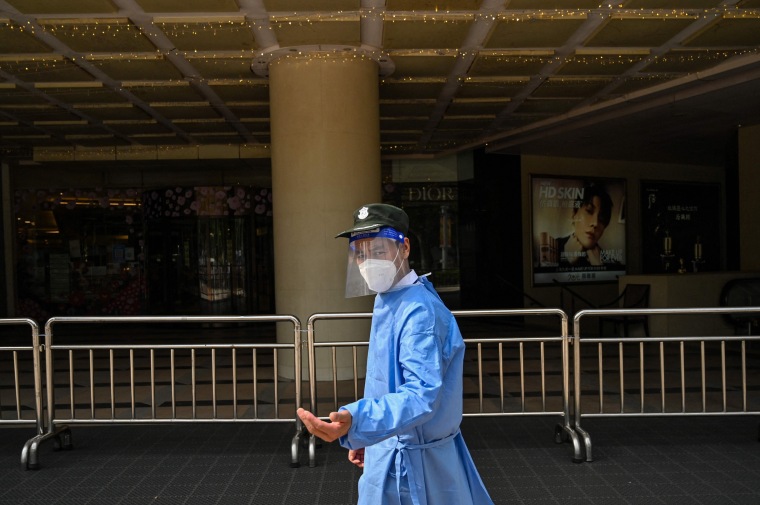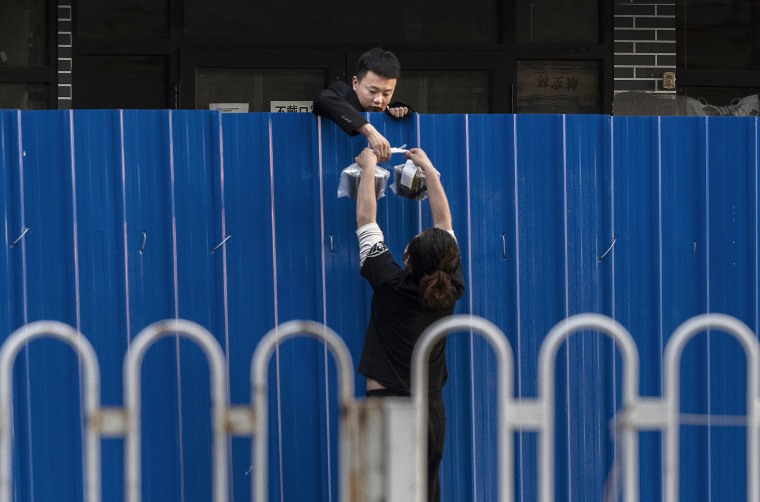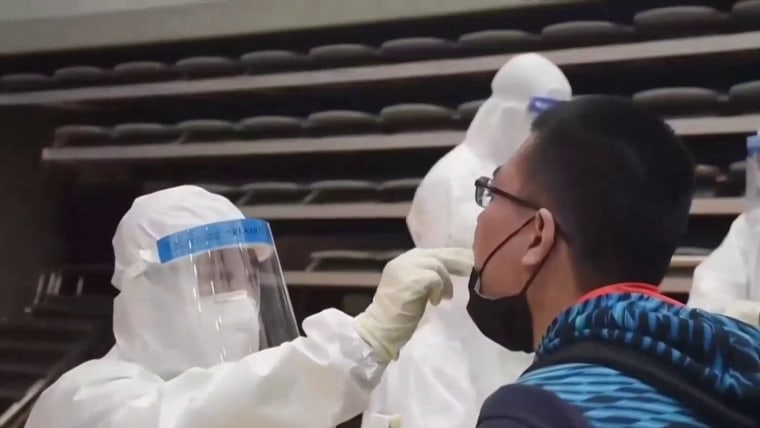WASHINGTON — President Joe Biden’s economic troubles stand to get even worse as the sweeping Covid lockdowns in China begin to ripple through the U.S. economy.
Administration officials, foreign policy experts and corporate executive warn of a potential “China time bomb,” as a GOP strategist put it, as weeks of lockdowns in Shanghai have disrupted the flow of a variety of products, from computer parts to cars.
For Biden and Democrats looking to hold on to control of Congress, the upheaval in China adds one more economic pressure point ahead of the midterm elections, with voters saying the economy and inflation are their top concerns. What’s more, officials in Washington fear it’s a problem largely out of their control.
“No question it’s going to have an impact on supply chains, but it’s also just going to have an impact on global commerce,” said Rep. Gerry Connolly, D-Va., a senior member of the Foreign Affairs Committee. “It’s of great concern.”
CEOs and Wall Street analysts have been warning in recent weeks of another wave of product shortages, particularly in the tech sector, that will add to already record inflation. Just how bad those effects will be depends on whether Chinese President Xi Jinping continues his zero Covid policy throughout the country or lessens it in the face of domestic backlash.
In Ohio, China policy is proving to be a focal point of one of this fall’s highest-profile Senate races. Rep. Tim Ryan, who is running as the Democratic Senate nominee, said he is “super worried” about the potential for a significant worsening of the supply chain crisis fueled by China’s lockdowns and zero Covid policy. Ryan said Democrats and the White House need to more clearly communicate the role China and Russia are playing in the supply chain crisis.
“I don’t think you’re going to see a correction because of the zero-tolerance policy in China any time soon,” Ryan, who has made China a focus of his campaign, said of the Chinese government’s efforts to contain the spread of Covid. “The way they’ve handled the whole thing is problematic.”
His opponent, Republican J.D. Vance, has also zeroed in on China. Both Ryan and Vance say short-term options to combat worsening conditions in China are limited, with each suggesting a tax cut to counteract additional inflation or shortages as one of limited options lawmakers can pursue.
“We’re going to have to solve the root causes, not just paper over them with some short-term stuff, even though that would be helpful,” said Vance, a strong critic of long-standing U.S. trade policy with China, adding, “Unfortunately, we’re in a very tough spot because of decisions that were made 30 years ago.”
There are daily discussions among officials at the White House, the State Department, the Commerce Department and the Transportation Department about lockdowns’ disrupting production and the supply chain amid growing anxiety over the limited control the U.S. has over the situation in China, officials said.
“There’s a lot of concern that that is what’s out of our control,” said a senior administration official who spoke on the condition of anonymity because he wasn’t authorized to talk to the media.
So far, the White House hasn’t seen a slowdown in goods coming from Asia as companies have shifted their operations to other parts of China and Asia, a White House official said. But officials continue to watch the data closely, as it can take time for the effects to ripple through the supply chain, said the official, who wasn’t authorized to speak on the record.
“It is something we know is very important and could have a big impact on our economy, and we are watching it very closely,” the official said. “Our economy is strong, but it is also interconnected to the global economy.”
In the meantime, administration officials continue to work with the ports to help them clear the cargo coming in so they are prepared for any potential surge of shipments from Shanghai once operations there normalize.

To help lower the overall cost of products coming from China, Biden said during his trip to Asia this month that he was considering the politically sensitive move of rolling back some of the Trump administration’s tariffs on China. Biden said he would discuss the issue with Treasury Secretary Janet Yellen, who has criticized the tariffs as doing more harm than good.
While Biden has no control over China’s widespread lockdowns, Republicans plan to blame him for any worsening economic conditions ahead of the midterm elections, said a national GOP strategist working on House campaigns. The strategist described the lockdowns as a “China time bomb.”
“Obviously, people see the videos of the lockdowns, and Republicans condemn that,” the strategist said. “But the supply chain issues are so complex that you need a Ph.D. in economics to fully grasp them. And even then, there are different theories on what exactly is going on with supply chain problems that people just don’t have time to dive into.”
Biden and Democrats have been looking for steps to lessen the U.S. dependence on products from overseas in the long term as the Covid disruptions and the war in Ukraine have highlighted the country’s dependence on foreign goods. But the effects of those efforts will take time, making it a difficult case to make to voters by November.
“It’s not like days and weeks, but I think over months and certainly years, re-architecting supply chains is going to be a major mandate for U.S. businesses,” said Jeremy Bash, a founder of the consulting company Beacon Global Strategies, who was a national security official in the Obama administration.
“Part of it is that Covid has laid bare this fragility of the China-related supply chain,” he said. “But the reality is the Russia-Ukraine crisis has also pointed out to everybody that if we were to get into a conflict with China — a military conflict with China, for example over Taiwan — that it would be much harder to extricate ourselves from China.”

In the meantime, the effects of the Shanghai lockdown are beginning to be felt.
In the last two weeks, the tech giant Cisco warned that the lockdowns would erase its sales growth for the quarter, Toyota said it was cutting its May production goals after it shut down some of its manufacturing, and the Ohio-based manufacturer Parker Hannifinestimated its sales next month would be cut by $100 million because of the shutdown.
The lockdowns have also caused development of one of Apple’s new iPhones to fall behind schedule, the Nikkei reported last week, citing multiple sources with direct knowledge of the matter.
Biden has already been struggling to cope with surging gas and food prices as a result of Russia’s invasion of Ukraine, which have come on top of already high prices for cars, housing and travel. Inflation has hit its highest level in 40 years, and even before China’s lockdowns, administration officials were warning it could persist at those high levels throughout the rest of the year and potentially 2023.
A recent unrelated baby food shortage caused by manufacturing problems at a Michigan plant has only added to the overall sense of anxiety among consumers, who less than a year ago were having to wait months for products they could once get in days because of Covid-related manufacturing shutdowns and port congestion last summer.
So far, retailers like Target and Walmart haven’t been experiencing the same level of product shortages they did last summer, but that could change if China continues its zero Covid policy and lockdowns spread, given the highly contagious nature of the omicron variant of the coronavirus.
“If the lockdowns expand to other regions of China and other ports, that could have a more significant impact, especially as we get into the peak holiday season,” said Jonathan Gold, the vice president of supply chain and customs policy at the National Retail Federation, a business trade group.
“Anything disrupting an already disrupted supply chain is going to have significant impacts,” Gold said.
Even if China eases its lockdowns soon and products start flowing at their normal place, there is still expected to be a surge of goods into U.S. ports that could create congestion and slow deliveries to retailers and manufacturers across the U.S.
“You’ve had Shanghai shut down, and now you’re going to have factories opening up. So that will definitely create a surge,” said Jon Monroe, a consultant who works with shipping companies. “How much of a surge is the real question. It’s not whether or not there will be a surge. There’s going to be. How much of a surge is the question.”
Published on The Perfect Enemy at https://bit.ly/3M4nSxj.

Comments
Post a Comment
Comments are moderated.